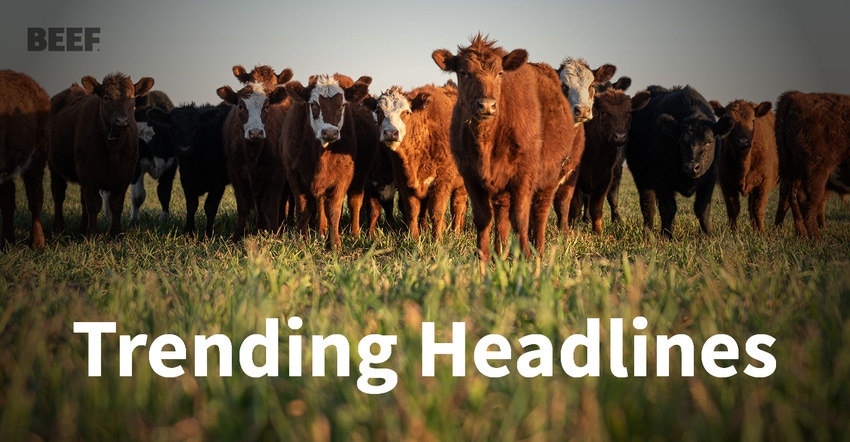5 Trending headlines in the beef world - Apr 19, 2022
Check out what everyone is talking about in the beef world.

Many things are happening in the beef world. From wild April blizzards to beef packers being called to Congress, there are many things impacting the bottom line including more wolves for parts of the country. Check out this week's gathering of trending headlines.
Ranchers in the Northern Plains finally got some moisture for their parched pastures. However, that moisture came in the form of the blizzard that was predicted. Several inches to a foot of snow fell and produced stiff winds that caused extensive blowing and drifting over a large part of North Dakota, northeastern Montana and northern Minnesota. The combined snow with blowing winds left ranchers working day and night to keep their calves safe. However, a second round of snow could be in the making if weather forecasters are right as a second snowstorm is building. It could fall starting Friday and last through Saturday as of now.
The CEOs of the four biggest U.S. beef producers — Cargill, Tyson, JBS and National Beef Packing — will testify before the House Agriculture Committee on rising meat price, Chair David Scott (D-Ga.) announced April 13. Increasing beef prices have coincided with a rise in inflation. The Biden administration has argued that large corporations have kept prices high to maintain profit margins.
Todd Nash, president of the Oregon Cattlemen’s Association, is hoping to see the expansion of some small and mid-sized processing and packing facilities in Oregon. To help with the expense of upgrading those facilities or building a new one to increase processing capacities for Oregon-raised livestock, the state Legislature allocated $2 million to the Oregon Meat Processing Infrastructure and Capacity Building Grant Program during the short session in February. The purpose of the grant program, according to the Oregon Department of Agriculture, is to help fund “equipment, physical improvements, technical assistance, processing hardware/software, on-site waste handling and education/training.” Nash, a rancher in Wallowa County in Northeastern Oregon, said $10 million was requested from the Legislature, which reduced the appropriation. Applications for funding up to $500,000 were accepted in February and March. Grants to help fund equipment will be awarded in May, and projects must be completed by June 30, 2023.
Colorado is expecting the birth of another litter of wolf pups any day now, creating both excitement and concern over the natural rebirth of a predator with a long, human-induced absence from the state. The breeding pair of wolves that naturally migrated into the state last year formed the pack north of Walden in Jackson County with the birth of six pups. Colorado Parks and Wildlife officials had watched the pups for some time before announcing their birth in early June as the first litter of wolf pups born in the state in several decades. And soon that pack could grow, as wolves typically have pups from mid-April through mid-May. State wildlife officials said staff has not seen evidence of denning behavior and no sign of a new litter from the pack this year. Wolves often use the same den unless disturbed by humans or other animals. A wolf litter usually consists of four to six pups. Studies have shown pup mortality rate in the first year of life varies from 40% to 70%. State wildlife officials said all six North Park pups have survived one year later. The pups are now adult size, weighing around 90 pounds.
Beef has gotten a bad rap when it comes to environmental sustainability, and the important role cattle play in environmental conservation is often omitted from headlines. It’s true that cattle produce methane, a greenhouse gas, and industry leaders are working to reduce the amount of methane cattle’s digestive systems produce. Dr. Ermias Kebreab, associate dean for global engagement in University of California-Davis’ College of Agricultural and Environmental Sciences, is studying the most effective feed supplements to limit climate impact. This, paired with the ecosystem benefits cattle provide, demonstrates cows are vital in sustaining healthy environments. “My research is focused on how we can make cattle more sustainable and reach climate neutrality. Cattle already provide natural benefits by enriching soil quality through carbon sequestration. I want to take cattle’s environmental benefits one step further,” says Kebreab. All too often the untold story is how cattle farmers and ranchers are actually helping to reduce the amount of carbon dioxide, the world’s most abundant greenhouse gas, in the environment through grazing cattle.
And a bonus: Certified Piedmontese is excited to announce the launch of the Certified Piedmontese store on Amazon featuring all snack items from the company's Grass Fed Grass Finished beef snacks product line. Consumers are now able to purchase the all-natural, healthy jerky snacks on Amazon and have it shipped to their door with Amazon Prime shipping.
Over the past year, Certified Piedmontese has been elated to supply an increasing demand of grass-fed beef snack products to health-conscious jerky lovers. While Certified Piedmontese's raw beef steaks have always been present on Amazon, it was not until March this year that the company made the switch to Fulfilment by Amazon (FBA) that falls more in line with shelf-stable snack items, reimagining the customer experience and providing increased ease of access to consumers across the nation.
About the Author(s)
You May Also Like


.png?width=300&auto=webp&quality=80&disable=upscale)
